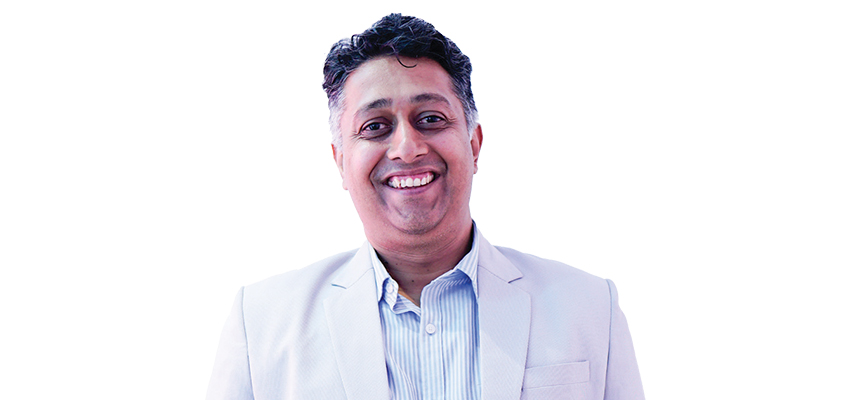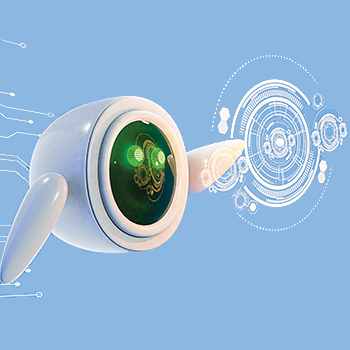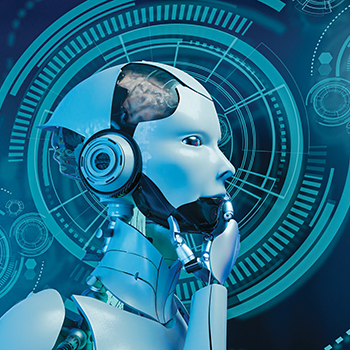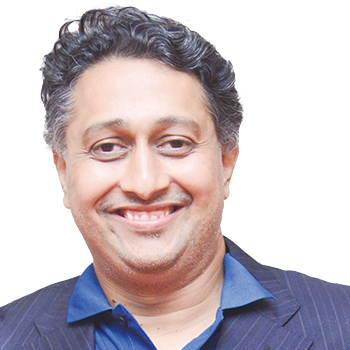Harnessing AI for growth

India has become the fifth largest economy in the world, as per IMF data. India continues to remain the third largest tech startup ecosystem globally, with over 950 tech startups founded in 2023, as per the NASSCOM June 2024 report. Tech startups contributions to job creation, skill development, innovation and attracting foreign investment are driving economic growth and transforming the country’s employment landscape. Ananthakrishnan Gopal, co- founder and CTO, DaveAI, in an exclusive interview with Corporate Citizen speaks about his career journey, their startup DaveAI, data security laws, impact of using chatbots and digital avatars, need for laws on AI in India, and much more
Corporate Citizen: Take us through your early life in school, college and with your family?
Ananthakrishnan Gopal: I went to Loyola High School from Std. I to XII in Pune. I was always interested in science, especially in physics and maths. I would love asking questions which could confound the teacher, sometimes to ill-effect. My family spoke Tamil at home, and being in a place where Marathi was commonly spoken, I was exposed to different cultures and learnt to look for commonalities rather than differences.
CC: How did your interest develop in AI and Machine Learning(ML) fields?
My interest in AI and ML started during my Master’s degree in Indian Institute of Science. I was already doing a course on Signal Processing, but started getting more and more interested in ML. Back in 2004, ML was a very obscure and upcoming field. But even then, the potential was clear to me. I wanted to learn more and more.
CC: How did you get on to the entrepreneurial bandwagon?
I actually wanted to make my career in academics right around the beginning of my Master’s degree. I spent eight years in academics, and then felt I need to learn more about different walks of life. First I joined a start-up and then a large company. It was clear that I felt more at ease in a start-up. But the ability to make an impact on a large number of people was what I loved working for a large company like Samsung R&D, where the application we developed was being used by millions of users. I wanted to develop such a technology and play an important role in it. That is what made me want to be an entrepreneur.
CC: What was the inspiration for starting DaveAI? How did you co-found DaveAI?
DaveAI was started with a candid discussion between us founders. Sriram PH, was a sales person all his life. He has sold everything from buckets to pet products to technology. He said that the most important aspect of being a sales person is being able to understand what someone needs. But a human sales representative has many drawbacks, they are very poor at reporting data. So, an organisation is unable to transfer knowledge about this customer across sales representatives. This seemed like an interesting challenge for me and Ashok Balasundaram validated that if we are able to build this technology, it will be highly sought after. We got together and put forward a plan for it all. We never looked back after that.
"In the field of advertisement and customer service, avatars would definitely have an impact because it is more emotionally potent than text"
- Ananthakrishnan Gopal
CC: You have said in one of your online posts that human-machine speech communication is one of the longest standing problems in AI and ML fields. Why do you think so and what are the challenges?

Definitely, the ability to express your requirement and getting it done by a machine is the ultimate holy grail of automation. Until very recently we had to convert our thoughts into specially designed machine languages. Not everyone was capable of doing this effectively. One had to spend years learning programming in order to do this effectively. In the last couple of years, we have made great strides towards making this easier and easier for humans. While it has been one of the longest standing problems, i.e. ever since humans have invented tools, it is very close to being solved today. Now we can speak to a computer and get a large part of your work done, as we might have communicated to a colleague or friend.
CC: Chatbots, developed using AI and natural language processing (NLP) tools, are being increasingly used by various leading companies to interact with customers? Do you feel that this trend will grow in future and how it is expected to benefit the companies and the industry?
Yes, this trend is here to stay. AI bots can be made available 24/7, can scale very quickly, are very easy to train (compared to a host of human beings) and can perform consistently at a specific level of performance. This makes it much cheaper for companies to reach out to customers. A lot of the first level of interactions and relatively mundane interactions will be increasingly taken care of by bots.
CC: Digital avatars are the next evolution of chatbots for more intelligent interactions with customers or people. How has it revolutionised the advertising, entertainment, customer service and other sectors and driving the sales of companies?
Having a human face and human voice has a large impact on convincing people. In the field of advertisement and customer service, avatars would definitely have an impact because it is more emotionally potent than text. In the field of entertainment, we would get to imagine a lot more without real world restrictions that physics and biology place on humans.
CC: What improvements do you expect to occur in the digital avatars and chatbots in future as AI and ML technology evolves?
The next two years will see a rapid growth and adoption of these technologies. Within three years however, these technologies will become more and more ubiquitous in a way that it would be integrated to almost everything we do.
"I think AI, being a largely data and people oriented technology, will have a huge future for Indians. AI being ever data hungry and ever directive hungry, will have an impact on the world at large and over India most definitely"
CC: Data privacy and data security are two challenges before AI usage in industry. What needs to be done to ensure data privacy and security is not compromised, as the usage of AI increases in various industries?
Private data, which can be tagged to a particular person, should strictly be kept away from companies. However, untagged, anonymous data should be freely available. Being able to distinguish these two is very important for the growth of AI without harming privacy or security. We need better guidance from governments across the world to make this distinction both clear and enforceable.
CC: How will the India Digital Personal Data Protection Act (DPDPA), 2023 affect the growth of AI and ML technologies?

The DPDPA will not affect the growth of the technologies. It will however affect how it is used. While there are aspects of this act which can protect the privacy of citizens from companies using AI, it should do more to protect the privacy of citizens from the unwanted gaze of the government, even if it was done from the point of view of security of the country.
CC: What future do you see for AI in India and the world at large?
I think AI, being a largely data and people oriented technology, will have a huge future for Indians. AI being ever data hungry and ever directive hungry, will have an impact on the world at large and over India most definitely. Not all the impact may be positive. It will surely lead to a drop in jobs in the short run, but will give rise to many new hitherto unknown job descriptions.
CC: With the evolution of AI and ML technologies, the machines will be able to communicate with each other without the need of humans, will in such scenario the machines may pose a threat to their creator, us humans?
I think we should always be open to any possibility. However, I don’t believe that machines being able to communicate with each other without us understanding is necessarily something to fear. The most important thing is that the machines which run the AI algorithms don’t have any purpose to exist than to run the bunch of algorithms it was designed to run again and again. But, there are other threats which we could have with such powerful systems, and most of that threat comes from other humans using it with an intent to either harm others or gain power for themselves.
CC: Union Minister Ashwini Vaishnaw at Global IndiaAI Summit 2024 has announced that the government will launch India AI mission for harnessing the power and potential of AI in various sectors for the benefit of society. Will the Indian society benefit from this mission and the power of AI?
There are three main things Indian societies are likely to benefit from AI. The first is ability to communicate in the language of their choice. Having more than 1000 languages, knowing a certain language was always a privilege. AI may be able to even the scales. The second aspect is in terms of access to knowledge. AI has the ability to answer specific questions and make knowledge which might have taken days or years to accumulate, to be made accessible in an easily understandable way. The third is in the field of education. Having good qualified teachers who could guide eager learners was always a problem in India due to the hectic pace at which we need to educate our children. I believe AI will have a massive impact on the way education is carried out in India.
CC: Experts have stressed the need to democratise AI technology, create compute infrastructure for AI startups and sovereignty in AI infrastructure so that India can use the AI tech models or tech from US and other countries without being affected by geo-political conflicts. What are your views about these issues?
‘Democratise AI’ is one of the mottos of our company too. Being a new technology, there is always a danger that the technology is hoarded by some countries or people of some classes. Being accessible to all people, and all countries is very important to keep it competitive. While this is true for all technologies, AI specifically is an aggregation of all of human knowledge until now. AI would be so very incomplete without the participation of as many people as possible, in both contributing to it as well as consuming it.
"I think you need to be a little crazy to be an entrepreneur. It is a huge risk one takes with their life and career and very often finances. But it is one of the most exciting journeys that you can take in life"
CC: The EU has passed a law about AI, the US has issued an executive order, and the UN has set up a dedicated body for AI issues. Do you feel that India too must have a law about AI issues? Why?

Yes, absolutely, AI just like many other technologies and tools is both extremely useful but also dangerous. It has to be used with responsibility by everyone. But just like knife which helps you cook, it can also be used to harm. There are always some in our society who will find ways to use it in a harmful way. But unlike a knife this technology can harm millions of people if not regulated carefully. It is imperative that governments around the world wake up and develop guidelines and guardrails for the benefit of everyone.
CC: What is your advice for those who aspire to be a successful entrepreneur?
You need to be a little crazy to be an entrepreneur. It is a huge risk one takes with their life and career and very often finances. But it is one of the most exciting journeys that you can take in life. It surely is not for everyone, but if you think you want to make a change, make an impact, then do take the plunge. You will come out of the other end a changed person.
CC: How do you maintain work-life balance in your busy life?
Work-life balance does not mean having equal time to work and equal time for the rest of your life. It means having other things of importance in your life. It means enjoying a bit, doing something or at least finding something else you love and are passionate about. This is required to get a perspective on your work. If you thought the only thing important is work, it would lead to frustration at some point and burnout later.
This is very tough sometimes. Being an entrepreneur, one is working constantly. Office seeps into home and home seeps into office. However, having hobbies helps this process a lot. I do a lot of singing, playing musical instruments, travel a bit, spend time having fun with my son. That helps me remain calm, collected and redefine what is important in life.